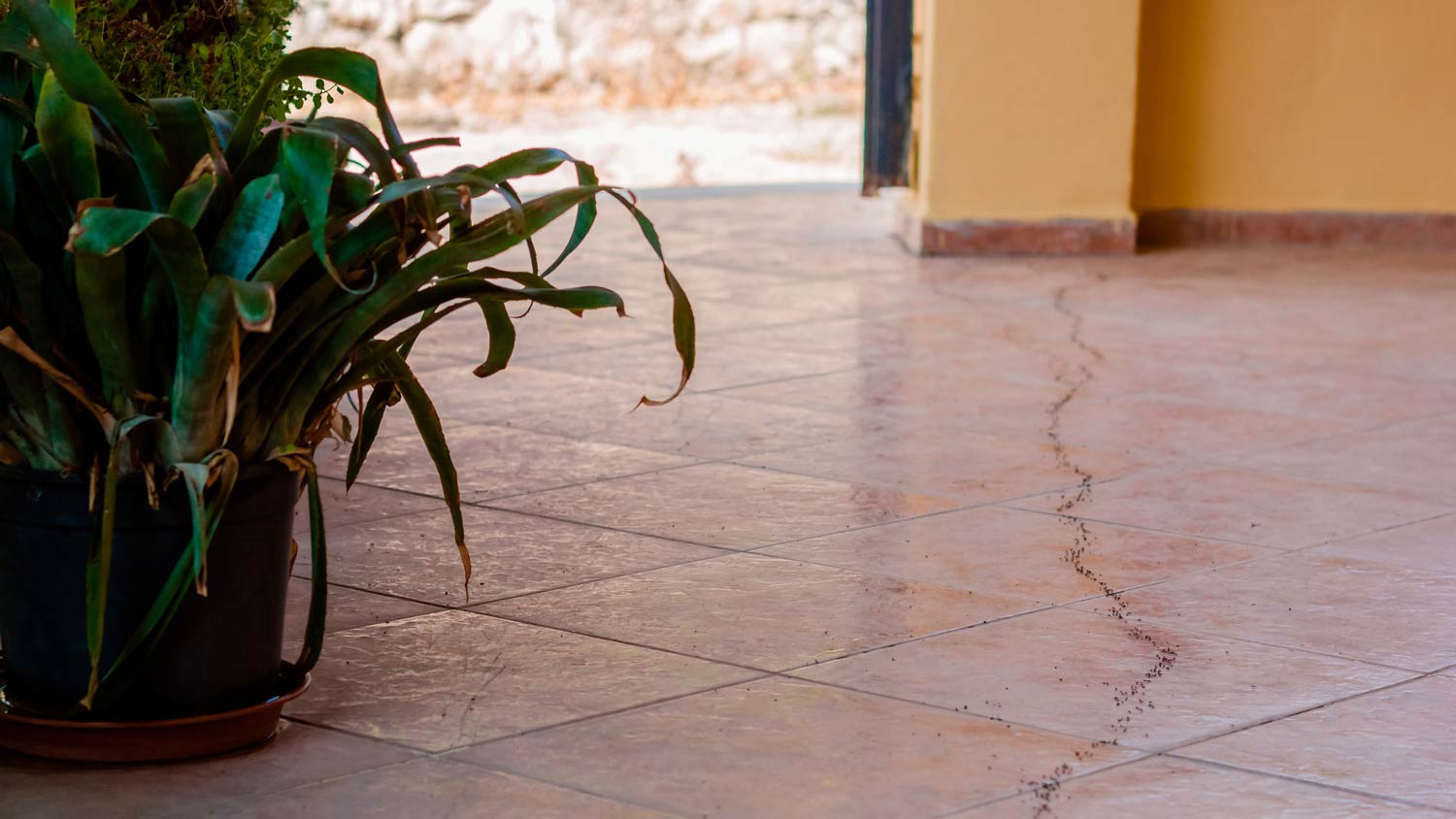
If you need to get rid of bugs and pests making your home unsafe, it's time to decide if fumigation is necessary. Learn more about average fumigation costs.
Help them march one by one straight out of your home


Ants are likely in your home because they have access to a food source.
Other reasons include unclean surfaces and leaky pipes.
Removing crumbs and residue can help eliminate ants.
You should call a pro if you have a persistent infestation.
Homeowners often find a few stray ants who squeeze their way in as the weather warms. But if their presence starts to feel like an ongoing parade, it’s time to wonder why there are ants in your house. Luckily, the reasons and solutions for ant infestations are relatively straightforward and, for better or worse, often involve you cleaning more.
The most common reason ants invade homes is open access to a food source, whether it be a fruit basket on the counter, dog food in the bowl, or leftovers on the table. Once ants sniff out a tasty treat, they follow each other to it.
Keep food in airtight containers and put fruit in the refrigerator, if possible. You will also need to clean up after every meal to make sure no crumbs or kitchen spills are left behind. If the ants have set up shop in your dry goods, you can place bay leaves in containers to deter them since the smell acts as a repellent. If the problem persists no matter how often you remove potential food sources, you may want to reach out to your local pest control specialist.

Ant infestations most likely occur in your kitchen, where surfaces such as cooktops, countertops, and ovens often have remnants of grease or other food residue. They can also be attracted to spillover on food items such as honey, syrup, and jam jars.
Wipe down honey and syrup bottles and jam jars after use to eliminate any excess liquid that could be attracting ants. You’ll also want to thoroughly wipe down your cooktop and surrounding countertop after use, especially after cooking greasy meats or dishes that tend to splatter.
Your garbage bin is probably the last item you want to clean, but it tends to collect the crumbs and food scraps that bring ants in. This is especially true if you’re tossing out items with high sugar content, such as soda bottles or canned food jars.
Empty your trash can, then take it outside to give it a good scrub down with a hose and hot, soapy water. You can also use vinegar or bleach to kill off any remaining residue or lingering scents. Once it’s dry, make sure to use high-quality garbage bags that won’t leak or tear easily, which can lead to excess spills. It’s also best to keep a lid on your garbage and take your trash out as frequently as possible to keep ants at bay.
Like humans, ants need water to survive, so any extra condensation surrounding your pipes can draw them indoors. Leaks under your sink or near faucets, especially in kitchens and bathrooms, are common ant attractors.
Check your faucets and underneath your sink regularly to spot any leaks or drips that may leave behind excess water. You’ll also want to ensure your windows are sealed when precipitation is in the forecast to prevent water from pooling inside—and bringing ants with it.
As their name suggests, carpenter ants are particularly drawn to rotting wood, which provides an ideal home for their colony if they can set up shop inside. Any moist or decaying wood in easily accessible parts of your home can bring carpenter ants in and lead to infestation.
Store wood away from your home and replace any rotting wood in your home’s structure or inside. Check for moist or rotting wood where leaks would be common, such as under sinks, behind washing machines, or near exposed pipes.
A stray ant here or there or a small trail that goes away once you remove a food source is nothing you can’t handle, but a full-on infestation will require the help of a pest control pro. If you have a persistent infestation, see large ants regularly, or spot multiple species of ants and nests nearby, it’s best to call an expert. They’ll be able to identify where they’re coming from and apply solutions to help remove ants from your home for good.
From average costs to expert advice, get all the answers you need to get your job done.

If you need to get rid of bugs and pests making your home unsafe, it's time to decide if fumigation is necessary. Learn more about average fumigation costs.

Your mosquito misting system cost will vary based on factors such as the size, type, brand, and more. Find out what the budget for this system looks like.

Find out how much it costs to remove armadillos and stop them from coming back. Know how much to budget to humanely remove these pesky critters from your yard.

Vole holes are a sure sign there are voles in your yard and you’ll want to figure out how to get rid of voles as quickly as possible to prevent damage to your garden.

“Water bugs” typically refer to a type of cockroach. Find out how to get rid of them instantly and keep them away for good in this handy DIY guide.

Some people swear by gentler ways to get rid of roaches that don’t involve spraying. From removing their food source to casting diatomaceous earth around, read on to learn about which of these are effective at keeping pests away.